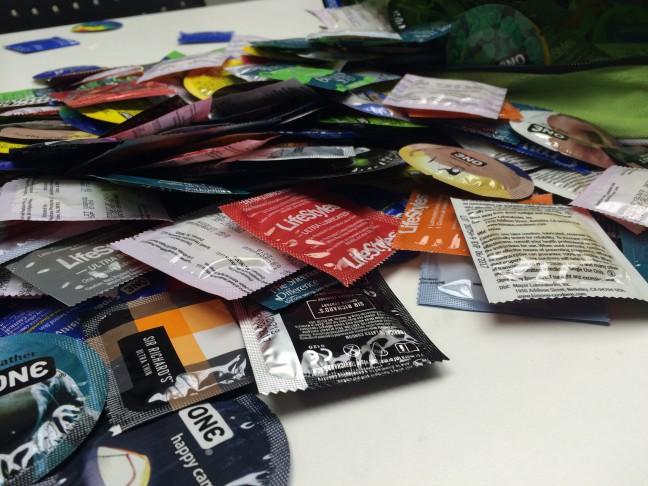The question is this: “Why do colleges offer sex seminars?”
Opinion columnist Christian Schneider penned a piece for the Milwaukee Journal Sentinel last week critiquing universities’ use of student money to fund sexual health resources on campus, including at very own University of Wisconsin. “Why is the university spending so much money teaching students to do something they’re doing anyway?” he asks.
To answer your question, Mr. Schneider, because many of us young folks are doing an atrocious job of “doing it” well, mostly because no one ever took the time to teach us how before entering our college years. Indeed, many practicing health care providers and educators consider poor sexual health among young Americans to be a full-blown public health crisis.
Here are just a few examples of what I’m talking about:
STIs and unplanned pregnancy
The Centers for Disease Control, Kaiser Family Foundation and Planned Parenthood all estimate that at least half of young people will acquire a sexually transmitted infection by the time they reach age 25. And half of the 20 million new cases of sexually transmitted infections in the United States — which is already the highest infection rate of any industrialized nation — are among 15-24-year- olds. Yikes. Unplanned pregnancy rates, though they are beginning to slowly decline, are through the roof compared to countries that have similar economies and resources. The state, health departments and private organizations funnel billions of dollars into treatment for the short and long-term health symptoms of STIs and into social welfare benefits often accompanied by unintended children. Education-driven sexual health resources aim to use a fraction of that money to prevent infections and pregnancies in the first place.
Sexual assault …
… And even more broadly, sexual harassment and sexual trauma. It is estimated that one in five women on this campus will experience sexual assault before they graduate. This is a reality that is unconscionable to me. If you know a handful of women (or about six men) you likely know a person who is walking through this world with trauma triggers, sexual shame, body dysphoria, anger, guilt, self-blame, self-doubt, depression or anxiety related to a sexual crime. As a survivor myself, I wish that someone would have sat down my perpetrators and talked to them about consent — and about mutual participation and sexual agency and shared pleasure and how sex should be thought of as a source of joy, laughter, giddiness, exploration and creativity. Sex is not a source of coercion, manipulation, use of unchecked power, or a game of collecting and conquering sexual experiences. These critical lessons are the exact learning objectives of student-funded educational groups such as Sex Out Loud, PAVE, the Campus Women’s Center and many more.
Sexual identity-based suicide and violence
Unfortunately, we have become all too familiar with cases of young people harming other young people or, perhaps worse, teens and adolescent adults taking their own lives after experiencing shame and ridicule because of sexual identity. Kids are bullied, harassed and called “fags,” “dykes,” “trannies,” “queers,” “sluts” and “skanks,” oftentimes regardless of their actual sense of self or sexual experience. Although sex seminars provide practical pointers for people looking to improve their skill sets in pleasure, positions, orgasms, relationships and more, the actual curriculum of these seminars is to normalize all kinds of sexual practices and relationships into our culture. It’s curriculum like this that eliminates the shame and stigma associated with these practices.
And just to humor Mr. Schneider, “the Great Orgasm Famine of 2013” you mock is indeed well-documented in sexology and sociology literature as a phenomenon referred to as …
The Orgasm Gap
For every orgasm the average American woman has, her male counterpart has three. Women are more likely to orgasm when they have sex with other women or when they masturbate than when they have sex with men. You can read about it here, here, here and here.
You may be asking yourself at this point, “How exactly do orgasm workshops and instructions on how to use sex toys relate to STIs and unplanned pregnancy?”
It’s because we are talking to students about sex, and young people do not have sex to use condoms. They do not have sex to use contraception. No one I know of has had the thought, “Gee-whiz, I sure do love condoms. I love the way they feel, look, smell, taste, sound. If only there was some activity I could partake in to get me some more of that condom action.” No! People have sex to experience pleasure, so their genitals and bodies will tingle and feel good when they rub together — to experience intimacy with other humans.
These student-funded groups utilize a myriad of carefully-crafted public health interventions to get students to learn about safer sex. You teach them how to make condoms feel better so they will use them. You teach them about pleasuring their partners to get the point across that communication and consent are necessary. You bring in the big porn star so that people will think your organization is cool and they’ll invite you to speak to their students about safer sex. To leave out the pleasure aspects of sex during sex education is missing the entire point.




















